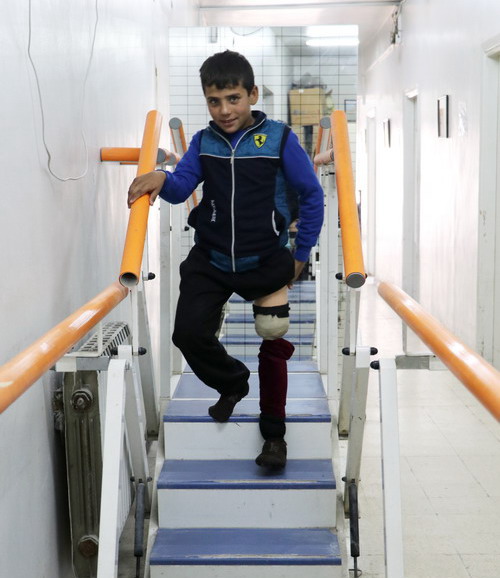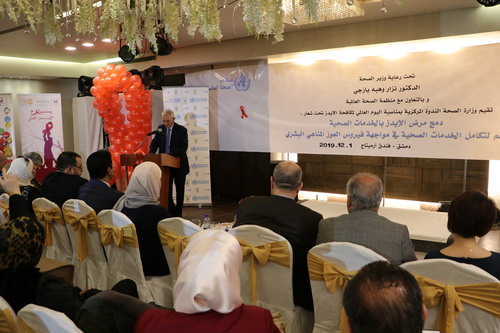Russia provides WHO a grant of US $ 3 million to support the people of Syria
21 January 2020 – WHO welcomes a new contribution of $3 million from the Russian Federation to support the provision of health care services for vulnerable people in the Syrian governorates of Dar'a, Deir-ez-Zor, Homs and Qunitera.
“We are extremely grateful for Russia’s generous contribution which has come as a major step towards reviving the availability of health care services to all people in need,” said Dr Nima Abid, acting WHO Representative in Syria. "Restoring the provision of health care services is a key building block for encouraging the return of displaced people, and enhancing peace and social protection,” Dr Abid added.
With this generous donation, WHO will strengthen public health care services for more than 1.1 million people living in the north-western, north-eastern and south-western governorates, where health infrastructure has been devastated by heavy fighting and the provision of primary health care services remains highly challenging. Many health care facilities in these areas have been forced to close because of damage to infrastructure, shortages in health staff, and limited medical supplies.
With support from the Russian Federation, WHO will scale up its efforts to improve primary health care and outreach health services, including mental health care services for survivors of gender-based violence, reproductive health services, and enhancing the national health information system at primary and secondary health care levels.
The funding will enable WHO to rehabilitate and equip 8 health facilities providing public and specialized health services in areas where the resumption of basic health care services will have the greatest life-saving impact, as well as facilities that receive patients from other parts of Syria. Access to essential health care services will be provided through the deployment of 15 mobile medical teams in severely affected areas to address the health needs of vulnerable and displaced populations.
Giving children with a disability in Syria new hope
 17 December 2019, Damascus, Syria – In the crowded reception area of the Disability and Physical Rehabilitation Centre in Damascus, 13-year old Ali from Ar-Raqqa governorate waits for his name to be called. His father Jaseem waits patiently with him, optimistic that his son will receive the best possible treatment. Ali was injured during a bombardment of his area of Ein Issa city in north-east Syria two years ago while helping his father in their small shop. Shrapnel hit his leg and he was rushed to hospital, where doctors had no choice but to amputate his leg above the knee. Since then, he has been fitted with a series of artificial left legs to accommodate his growing body.
17 December 2019, Damascus, Syria – In the crowded reception area of the Disability and Physical Rehabilitation Centre in Damascus, 13-year old Ali from Ar-Raqqa governorate waits for his name to be called. His father Jaseem waits patiently with him, optimistic that his son will receive the best possible treatment. Ali was injured during a bombardment of his area of Ein Issa city in north-east Syria two years ago while helping his father in their small shop. Shrapnel hit his leg and he was rushed to hospital, where doctors had no choice but to amputate his leg above the knee. Since then, he has been fitted with a series of artificial left legs to accommodate his growing body.
Concerted efforts to eradicate AIDS in the Syrian Arab Republic

8 December 2019, Damascus — On the occasion of World AIDS Day (1 December) and under the slogan ”My health needs under one roof; integrating HIV health services,” WHO, in cooperation with the Syrian Ministry of Health, called for more concerted action to prevent HIV and highlighted global obligations to provide people living with HIV the life-saving treatment they need in a manner that respects their dignity and human rights.
WHO gravely concerned about humanitarian situation in northeast Syria

13 October, Cairo, Egypt — WHO is gravely concerned about the humanitarian health situation in northeast Syria, where up to 200,000 people have been displaced as a result of increased military operations since 9 October, and almost 1.5 million people are in need of health aid. Many of those affected by the recent hostilities have already experienced immense physical and mental stress as a result of years of conflict and repeated displacement.
People in need of essential health care services face challenges related to insecurity and limited access to health care. Already weakened health services in northeast Syria have been severely impacted by the latest security developments. The national hospital in Ras Al-Ain is currently out of service, and the national hospital and two health centers in Tel Abyad are also currently non-functional. The three field hospitals in Al-Hol camp have limited their services since 12 October as a result of the escalation of hostilities which has impeded access of health staff to the camp. All health facilities in camps hosting displaced people in Ain Issa and Ras al Ain have also been evacuated, with additional facilities under threat as the conflict rapidly escalates.


